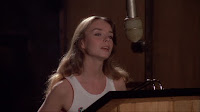By the late 1980s,
after having had my filled of Robbins, Collins, Sheldon, I was ready to
discover new authors. In came Lisa Robinson’s WALK ON GLASS (1983, Charter Books). I picked that one up during one of my hunts for used
bookstores. After having amassed enough trashy paperbacks to fill at least two
shelves in my reading room, I went back home and I started the novel right away.
I remember how good a time I had with it. Like its many predecessors, it had something
of a roman à clef. It would be interesting to see if the fun is still palpable
after all these years. But what I do recall most is that WALK ON GLASS was penned by then-syndicated music columnist Lisa
Robinson. I had glimpsed at her articles in some New York paper once or twice and
thought them to be quite interesting. And since I’ve always been attracted to
the glitter or not so glitter aspect of show business it came as no surprise that
I found her novel to be just as fascinating.
Indeed, the music
industry is the main focus for this tale of love gone wrong during the rise and
fall of a singer/songwriter. Unless I’m very much mistaken it goes something
like this: she’s on top of the charts, meets the man of her dreams and—surprise,
surprise—ends up being cheated on. Then she breaks—big time, so much so that
you wish you could do a MOONSTRUCK on her. Snap
out of it! But since we all know that without cupid doing his thing, novels
like this one would barely exist, we suffer greatly with her and hope that she
rises above. She does eventually, like any good heroine can. What’s even more rewarding,
however, is that beyond her fall out, WALK
ON GLASS is an insightful encyclopedia of who’s who in the music biz. Expect
to be enthralled by this and by those inside scoops which in the end mostly reveal
that screwing one another for a few bucks is certainly one’s main priority. I
have no doubts that it still is today.
WALK ON GLASS is sadly Lisa Robinson’s sole novel. I would have
loved for her to continue on her path as a novelist. She is currently a
contributing editor at Vanity Fair. Her memoir THERE GOES GRAVITY: A LIFE IN
ROCK AND ROLL was published in 2014 by Riverhead Books. I may check that one
out, as you all should WALK ON GLASS.
Until next
post—Martin



































